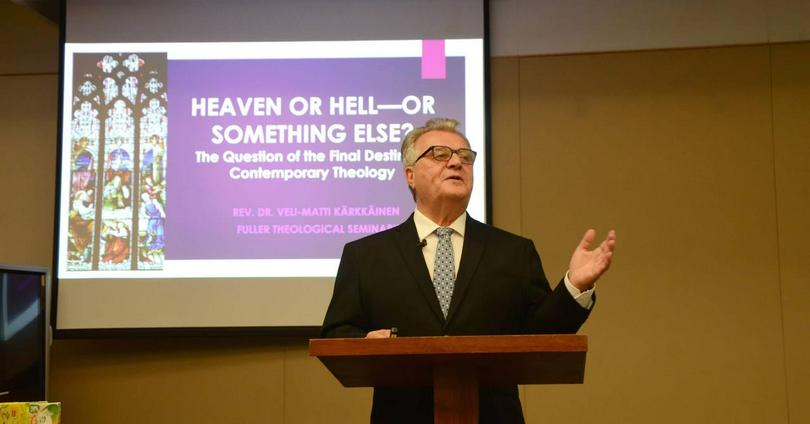On October 15, 2025, Hong Kong Baptist University's (HKBU) Faculty of Arts and Social Sciences and the Centre for Sino-Christian Studies hosted a lecture by Dr. Veli-Matti Kärkkäinen, Professor of Systematic Theology at Fuller Theological Seminary, titled "Heaven or Hell - or Something Else: The Question of the Final Destiny in Contemporary Theology," with Prof. James Dominic Rooney of HKBU serving as moderator and respondent.
Dr. Kärkkäinen began his lecture by surveying the theological landscape, starting with the traditional doctrine of hell and its modern objections before moving to major alternatives like Annihilationism and Universalism—the doctrine that all people will ultimately be saved. The core of his presentation was his own constructive proposal, which he defined as being "against universalism, but in support of an optimism of salvation."
He rejected what he called "dogmatic universalism" on several grounds: it contradicts numerous biblical passages, fails to satisfy demands for justice, and ultimately undermines human freedom by making God's will coercive rather than invitational. But rather than defaulting to traditional teachings on hell, he proposed something different: an "optimism of salvation."
This optimism, he clarified, is not doctrinal certainty but profound hope—an active theological posture rather than a stated belief. Drawing on the work of theologians like Kallistos Ware and Donald Bloesch, Dr. Kärkkäinen grounded this hope in God's mysterious and persistent love, which may continue working even beyond physical death. He pointed to biblical passages suggesting a surprisingly generous welcome into God's kingdom, passages that resist easy categorization into either universalist or traditionalist frameworks.
In his response, Prof. Rooney affirmed much of Dr. Kärkkäinen's approach but pressed back on key points. He agreed that the doctrine of hell remains essential to Christian orthodoxy but argued for a reframing. Hell, he suggested, should not be understood as arbitrary divine punishment or torture. Instead, it represents the painful, self-inflicted experience of encountering God's presence by a soul that has freely and definitively chosen to reject divine love. In Prof. Rooney's philosophical reading, hell is less about God's wrath and more about the soul's own alienation.
His sharpest challenge was directed at universalism itself. If universal salvation is guaranteed—a metaphysical necessity flowing from God's nature—then it creates what Prof. Rooney called "a more severe problem of evil." Under that logic, all historical suffering becomes a necessary component of God's plan to bring everyone to heaven, raising uncomfortable questions about divine responsibility for human pain.












